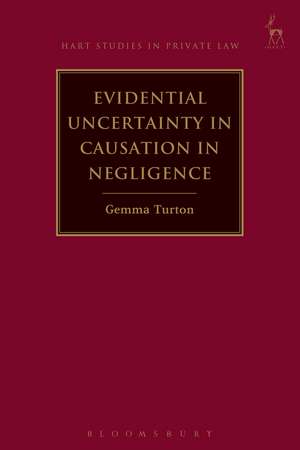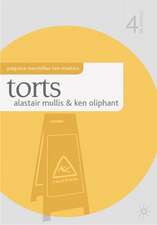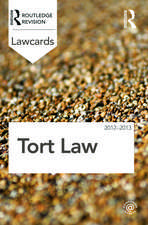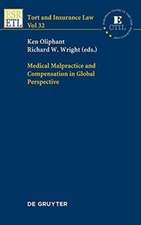Evidential Uncertainty in Causation in Negligence: Hart Studies in Private Law
Autor Gemma Turtonen Limba Engleză Paperback – 31 oct 2018
| Toate formatele și edițiile | Preț | Express |
|---|---|---|
| Paperback (1) | 232.54 lei 6-8 săpt. | |
| Bloomsbury Publishing – 31 oct 2018 | 232.54 lei 6-8 săpt. | |
| Hardback (1) | 511.81 lei 6-8 săpt. | |
| Bloomsbury Publishing – 18 mai 2016 | 511.81 lei 6-8 săpt. |
Din seria Hart Studies in Private Law
- 28%
 Preț: 498.73 lei
Preț: 498.73 lei - 30%
 Preț: 1129.41 lei
Preț: 1129.41 lei - 30%
 Preț: 509.60 lei
Preț: 509.60 lei - 22%
 Preț: 238.22 lei
Preț: 238.22 lei -
 Preț: 217.53 lei
Preț: 217.53 lei - 28%
 Preț: 374.46 lei
Preț: 374.46 lei - 22%
 Preț: 237.66 lei
Preț: 237.66 lei - 28%
 Preț: 437.06 lei
Preț: 437.06 lei - 30%
 Preț: 601.04 lei
Preț: 601.04 lei - 28%
 Preț: 436.15 lei
Preț: 436.15 lei - 30%
 Preț: 602.11 lei
Preț: 602.11 lei - 18%
 Preț: 302.52 lei
Preț: 302.52 lei - 22%
 Preț: 258.42 lei
Preț: 258.42 lei - 22%
 Preț: 225.06 lei
Preț: 225.06 lei - 30%
 Preț: 569.60 lei
Preț: 569.60 lei - 30%
 Preț: 600.06 lei
Preț: 600.06 lei - 30%
 Preț: 598.45 lei
Preț: 598.45 lei - 18%
 Preț: 322.23 lei
Preț: 322.23 lei - 28%
 Preț: 498.16 lei
Preț: 498.16 lei - 18%
 Preț: 320.53 lei
Preț: 320.53 lei - 30%
 Preț: 601.29 lei
Preț: 601.29 lei - 30%
 Preț: 541.54 lei
Preț: 541.54 lei - 30%
 Preț: 570.99 lei
Preț: 570.99 lei - 22%
 Preț: 261.64 lei
Preț: 261.64 lei - 30%
 Preț: 540.38 lei
Preț: 540.38 lei - 30%
 Preț: 838.22 lei
Preț: 838.22 lei - 30%
 Preț: 541.38 lei
Preț: 541.38 lei - 18%
 Preț: 357.83 lei
Preț: 357.83 lei - 30%
 Preț: 774.86 lei
Preț: 774.86 lei - 22%
 Preț: 269.76 lei
Preț: 269.76 lei - 30%
 Preț: 719.33 lei
Preț: 719.33 lei - 30%
 Preț: 774.28 lei
Preț: 774.28 lei - 18%
 Preț: 322.05 lei
Preț: 322.05 lei - 22%
 Preț: 776.24 lei
Preț: 776.24 lei - 27%
 Preț: 409.73 lei
Preț: 409.73 lei - 30%
 Preț: 569.37 lei
Preț: 569.37 lei - 30%
 Preț: 514.01 lei
Preț: 514.01 lei - 30%
 Preț: 544.05 lei
Preț: 544.05 lei
Preț: 232.54 lei
Preț vechi: 297.98 lei
-22% Nou
Puncte Express: 349
Preț estimativ în valută:
44.50€ • 46.46$ • 36.83£
44.50€ • 46.46$ • 36.83£
Carte tipărită la comandă
Livrare economică 05-19 aprilie
Preluare comenzi: 021 569.72.76
Specificații
ISBN-13: 9781509924486
ISBN-10: 1509924485
Pagini: 264
Dimensiuni: 156 x 234 x 12 mm
Greutate: 0.43 kg
Ediția:NIPPOD
Editura: Bloomsbury Publishing
Colecția Hart Publishing
Seria Hart Studies in Private Law
Locul publicării:London, United Kingdom
ISBN-10: 1509924485
Pagini: 264
Dimensiuni: 156 x 234 x 12 mm
Greutate: 0.43 kg
Ediția:NIPPOD
Editura: Bloomsbury Publishing
Colecția Hart Publishing
Seria Hart Studies in Private Law
Locul publicării:London, United Kingdom
Caracteristici
It seeks to bring clarity to this area of the law by adopting a clear approach to the function of the doctrine of causation within a corrective justice-based account of negligence liability.
Notă biografică
Gemma Turton is a Lecturer in Law at the University of Leicester.
Cuprins
Introduction 1. Theoretical and Doctrinal Framework 2. Identifying the Proper Function of Causation Part I: Identifying the Function of Causation in Negligence Part II: Tests for Causation Part III: Using NESS to Overcome Common Problems with Exceptional Legal Tests 3. Proof of Causation 4. Loss of a Chance Part I: Loss of a Chance: Proportionate Recovery for Physical Harm Part II: The 'Lost Opportunity' as Damage 5. The Evidentiary Gap Conclusion
Recenzii
The author's analytical approach and clarity of thought not only enables non-English readers to gain an insight into English law but is also conductive to a better understanding of the problems of evidential uncertainty... Her thorough critical discussion of the loss of chance and material increase of the risk approaches in English law is exceedingly interesting. All parts of the book are tightly connected, the analysis is consistent and the author's message clear: there is a need of coherence in the law of negligence, best achieved through a corrective justice-based understanding, that leaves no room for the success of claims in cases of evidential uncertainty.
I cannot recommend this outstanding book highly enough. Evidential Uncertainty in Causation in Negligence is a tremendous piece of scholarship that is lucidly written, thoroughly researched, and packed with stimulating insights. It can hold its own against the other excellent monographs that have recently been published on this topic, and clarifies many issues in this notoriously recalcitrant area of tort doctrine.
Turton's analysis is a good example of joined-up thinking, fortified by a robust account of the relevant case law and corresponding literature. It will certainly assist those wanting to access the practical relevance of NESS to English common law, and anyone struggling to consolidate the conceptual and pragmatic challenges generated by evidential uncertainty in causation in negligence. This work provides a useful tool for navigating infamously difficult legal waters.
Turton ... delivers on her promise to provide an account of the law of negligence that overcomes many of the difficulties presently encountered in this notoriously difficult area of law. Evidential Uncertainty in Causation in Negligence is well worth reading.
I cannot recommend this outstanding book highly enough. Evidential Uncertainty in Causation in Negligence is a tremendous piece of scholarship that is lucidly written, thoroughly researched, and packed with stimulating insights. It can hold its own against the other excellent monographs that have recently been published on this topic, and clarifies many issues in this notoriously recalcitrant area of tort doctrine.
Turton's analysis is a good example of joined-up thinking, fortified by a robust account of the relevant case law and corresponding literature. It will certainly assist those wanting to access the practical relevance of NESS to English common law, and anyone struggling to consolidate the conceptual and pragmatic challenges generated by evidential uncertainty in causation in negligence. This work provides a useful tool for navigating infamously difficult legal waters.
Turton ... delivers on her promise to provide an account of the law of negligence that overcomes many of the difficulties presently encountered in this notoriously difficult area of law. Evidential Uncertainty in Causation in Negligence is well worth reading.















